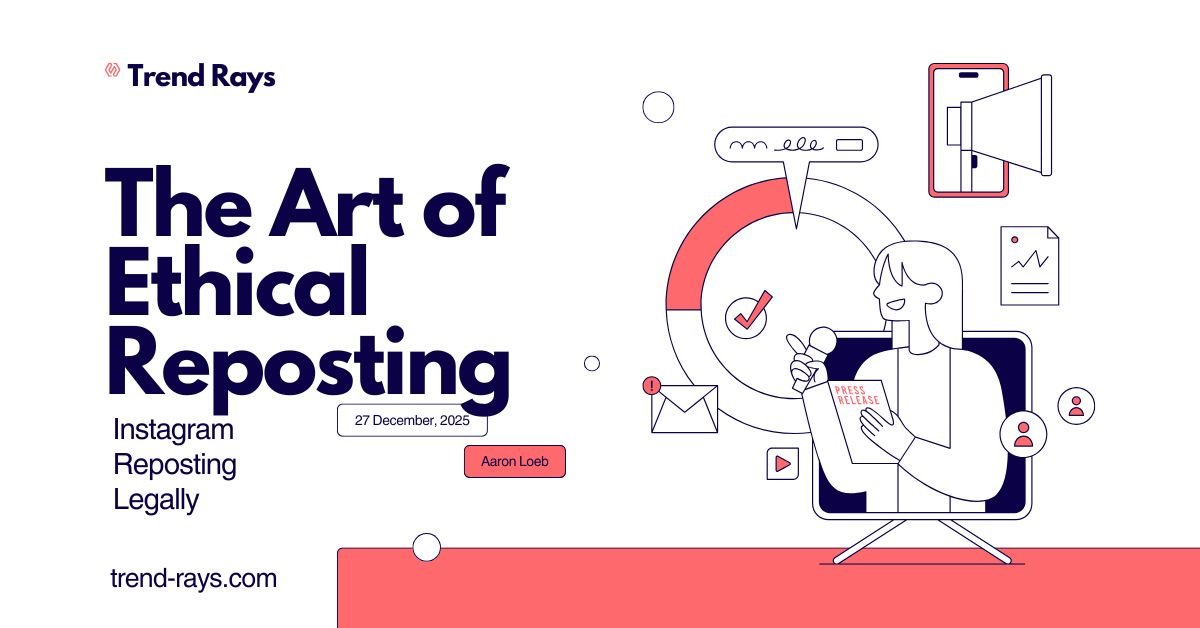Instagram is a vibrant ecosystem of creativity, and sometimes, you stumble upon content so brilliant, funny, or inspiring that you must share it with your audience. That’s where the urge to repost comes in. While using an Instagram repost app or a repost app for Instagram can seem like the easiest route, understanding the nuances of ethical and legal sharing is crucial in 2025. It’s about more than just hitting a button; it’s about respecting creators and building a positive online community.
This guide will walk you through the essential aspects of responsible reposting, ensuring you stay on the right side of etiquette and the law, whether you’re using the best repost app for instagram, looking for an app to share Instagram videos, or even exploring a free repost instagram app.
Why Ethical Reposting Matters
Think about the effort that goes into creating content. From brainstorming ideas and filming/shooting to editing and crafting the perfect caption, creators pour their time and energy into their work. Reposting without proper credit or permission can feel like a digital slight, undermining their visibility and potential growth.
Furthermore, ignoring copyright can have serious legal ramifications. While Instagram’s terms of service outline certain permissions, it’s always best to err on the side of caution and respect intellectual property.
The Golden Rules of Ethical Instagram Reposting
- Always Seek Explicit Permission: This is the cornerstone of ethical reposting. Before you even think about using an application repost instagram or the best Instagram repost app, reach out to the original creator. A simple direct message (DM) explaining that you’d love to share their post with your audience is usually sufficient. Be specific about which post you want to share and where (your feed or stories).
- Pro Tip: Save templates for permission requests to streamline the process.
- Give Prominent and Clear Credit: Simply tagging the creator in the caption isn’t always enough. Make sure their username is visible within the reposted image or video itself, especially if you’re using an ig repost app. Many of the best repost apps for Instagram, whether for Android or iPhone, offer features to overlay the original handle.
- Best Practice: Tag the creator in the caption and visually within the content. Mention their name in your caption and briefly explain why you loved their post.
- Maintain the Integrity of the Original Content: Avoid making significant edits to the reposted content without explicit permission. This includes cropping, adding filters (unless it’s a minor adjustment and doesn’t alter the original message), or removing watermarks (unless specifically asked to by the creator). If you’re looking for an app to share instagram posts while preserving quality, ensure it doesn’t degrade the original.
- Understand the Difference Between Feed and Stories Reposts: While sharing to your Instagram Story is generally less formal, the principle of giving credit remains. Use the built-in “Add to Story” feature and ensure the original account is tagged. If you’re using a repost instagram app to share to your story, ensure it includes proper attribution.
- Be Mindful of Context: Consider the context of the original post and your own audience. Does the content align with your values and brand? Reposting something that could be misconstrued or offensive, even with credit, can reflect negatively on your own profile.
- Respect “No Repost” Requests: Some creators explicitly state that they do not want their content reposted. Always respect these wishes, regardless of how much you love the post or which repost instagram video app you’re using.
Navigating Legal Considerations
While crediting is crucial for ethical sharing, understanding copyright is vital for legal compliance. Copyright law protects original works of authorship. Generally, the creator of a piece of content owns the copyright.
- Implied Permission vs. Explicit Permission: Just because someone posts publicly on Instagram doesn’t automatically grant you the right to repost it without permission. While there might be an implied permission for Instagram’s own sharing features, it’s always safer to seek explicit consent, especially if you are a business or have a large following.
- User-Generated Content (UGC): If you’re a brand looking to share user-generated content (e.g., customers using your products), having clear terms and conditions or obtaining specific consent for each repost is essential.
- Fair Use (Limited in This Context): The concept of “fair use” exists in copyright law, allowing limited use of copyrighted material for purposes like criticism, commentary, news reporting, teaching, scholarship, or research. However, simply reposting someone’s creative work for your own gain or engagement generally doesn’t fall under fair use.
Choosing the Right Tools Responsibly
If you choose to use a third-party instagram repost app, be discerning.
- Prioritize Apps with Clear Attribution Features: Opt for apps that make it easy to add watermarks with the original creator’s handle or seamlessly integrate tagging.
- Be Wary of Apps Requesting Excessive Permissions: Avoid apps that ask for more access to your account than necessary.
- Read Reviews and Understand the App’s Functionality: Ensure the app functions as intended and respects Instagram’s terms of service. Remember, even the best repost app for instagram iphone or Android should be used ethically.
In Conclusion
In the dynamic world of Instagram, sharing is a significant part of the experience. By embracing the art of ethical reposting, you not only respect the hard work of fellow creators but also contribute to a more positive and legally sound online environment. So, before you reach for that free repost instagram app or any other app to share instagram posts, take a moment to seek permission, give credit, and share responsibly. It’s a small effort that makes a big difference.



